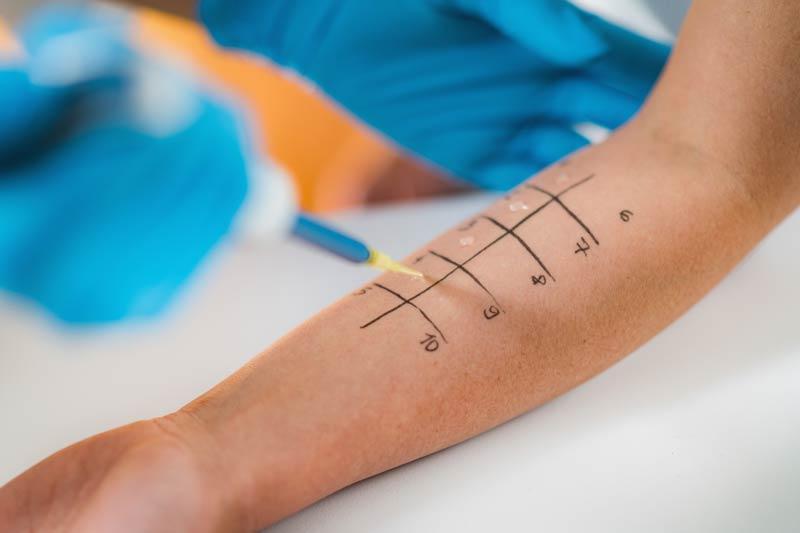Everything You Need to Know About Allergy Testing

Allergies affect millions of people worldwide, causing discomfort and, in some cases, serious health issues. From seasonal pollen and pet dander to certain foods and medications, allergies can trigger a wide range of symptoms that disrupt daily life. If you suspect that you may have allergies, the most effective way to identify your triggers is through allergy testing.
What Is Allergy Testing?
Allergy testing is a diagnostic process that helps identify substances, called allergens, that trigger an abnormal immune response in your body. When exposed to an allergen, your immune system mistakenly perceives it as harmful, releasing chemicals like histamine. This reaction leads to allergy symptoms such as sneezing, itching, rashes, or even more severe reactions like difficulty breathing or anaphylaxis.
By pinpointing specific allergens, healthcare providers can develop personalized treatment plans to help you manage or even prevent allergic reactions.
Why Allergy Testing Is Important
Many people live with undiagnosed allergies, misinterpreting their symptoms as common colds, digestive problems, or skin conditions. Without proper diagnosis, they may continue to suffer or use ineffective treatments. Allergy testing offers several key benefits:
· Accurate Diagnosis: Identifies exactly which allergens are causing your symptoms.
· Personalized Treatment: Allows healthcare providers to design targeted management plans.
· Improved Quality of Life: Reduces symptoms and helps prevent severe reactions.
· Avoiding Unnecessary Restrictions: Pinpoints real triggers so you don’t have to avoid foods or environments unnecessarily.
· Early Intervention: Helps detect and treat allergies before they worsen.
Common Symptoms That Indicate You May Need Allergy Testing
Consider getting tested if you experience any of the following recurring or persistent symptoms:
· Sneezing, runny, or congested nose
· Itchy, watery, or red eyes
· Wheezing, shortness of breath, or chronic cough
· Skin rashes, eczema, or hives
· Digestive problems such as bloating, nausea, or diarrhea after eating certain foods
· Swelling of the lips, tongue, or throat
· Sudden reactions after insect bites or stings
If these symptoms occur repeatedly, allergy testing can help determine whether allergens are to blame.
Types of Allergy Testing
Several types of allergy tests are available, each suited for different scenarios. Your healthcare provider will recommend the most appropriate option based on your symptoms and medical history.
1. Skin Prick Test (SPT)
The skin prick test is one of the most common methods of allergy testing.
· A small drop of potential allergen is placed on your skin, typically on the forearm or back.
· The skin is lightly pricked to allow the allergen to penetrate the surface.
· If you’re allergic, a raised, red bump will appear within 15–20 minutes.
· This test is quick, minimally invasive, and provides immediate results.
Best for: Environmental allergies (pollen, dust mites, pet dander) and some food allergies.
2. Intradermal Skin Test
· A small amount of allergen is injected just beneath the skin.
· This test is more sensitive than a skin prick test and is often used to confirm results or diagnose insect venom allergies.
Best for: Insect sting allergies and cases where a skin prick test is inconclusive.
3. Patch Testing
· Adhesive patches containing suspected allergens are placed on your back.
· The patches stay in place for 48 hours, and reactions are evaluated after removal.
Best for: Identifying contact allergies such as reactions to cosmetics, metals, latex, or fragrances.
4. Blood Tests (Specific IgE Tests)
· Measures the level of allergy-related antibodies (IgE) in your blood.
· Ideal for people who cannot undergo skin tests due to certain medications or skin conditions.
· Results are available in a few days rather than immediately.
Best for: Food allergies, medication allergies, and cases where skin testing isn’t possible.
How to Prepare for Allergy Testing
Preparation is key to ensuring accurate results. Before your appointment:
· Consult Your Doctor: Discuss your symptoms, medical history, and current medications.
· Avoid Antihistamines: These can interfere with test results. Your doctor may ask you to stop taking them a few days before the test.
· Dress Comfortably: Some tests require access to your arms or back, so wear loose-fitting clothing.
· Bring Notes: Make a list of symptoms, triggers you’ve noticed, and any questions you may have.
What to Expect During the Test
· Quick Process: Most skin tests take 20–40 minutes, while blood draws are even quicker.
· Minimal Discomfort: Skin pricks feel like light scratches. Some itching or redness may occur but subsides quickly.
· Immediate Results: Skin tests provide same-day results, while blood tests may take a few days.
Understanding Your Results
After the test, your provider will explain which allergens caused a reaction. Treatment may include:
· Avoidance Strategies: Identifying and limiting exposure to specific triggers.
· Medications: Antihistamines, nasal sprays, or corticosteroids to control symptoms.
· Allergen Immunotherapy: Allergy shots or tablets to desensitize your immune system gradually.
Managing Allergies for a Healthier Life
While allergy testing doesn’t cure allergies, it provides a roadmap for effective management. By knowing your triggers, you can make informed lifestyle changes, reduce flare-ups, and prevent severe reactions. For instance:
· Using air purifiers to minimize dust and pollen indoors
· Choosing hypoallergenic bedding
· Reading food labels carefully to avoid allergens
· Keeping emergency medication, like epinephrine, on hand if you have severe allergies
Conclusion
Allergy testing is a vital step toward understanding your body and taking control of your health. Whether you’re dealing with seasonal sniffles, food sensitivities, or unexplained skin reactions, identifying your triggers can bring relief and peace of mind. By working with a trusted healthcare provider, you can develop a personalized plan to manage your allergies and live a healthier, more comfortable life.
- Art
- Causes
- Crafts
- Dance
- Drinks
- Film
- Fitness
- Food
- Παιχνίδια
- Gardening
- Health
- Κεντρική Σελίδα
- Literature
- Music
- Networking
- άλλο
- Party
- Religion
- Shopping
- Sports
- Theater
- Wellness


